A Walk Over the Pulaski Bridge with Leslie Jamison
"Oh, here you are in all your humanness and all your awkward laughter."
“This is such a beautiful view.”
It’s a cold day in Brooklyn and Leslie Jamison and I are looking out over the East River at the skyline of Manhattan. The wind is whipping off the water and turning our cheeks red, but the sun is burning high and bright in the clear blue sky. We pause and quietly take in the splendor together.
I haven’t worked up the courage to let Leslie know this yet, but I’m not exactly sure where we are. When I emailed her to ask if she’d be interested in taking a walk she simply replied, “Let’s cross the Pulaski.” The name rung a bell, but I wasn’t sure if it was a bridge, a river, or even a neighborhood. But I’d soon find out.
Leslie and I will spend the entire afternoon walking and continue on after the sun goes down. Our conversation will come easily, a natural flow, as we exit one borough and enter another. All the while Leslie will constantly point out small things that I fail to notice, and ask questions about our surroundings to no one in particular. She is genuinely curious about the world, and about other people, often responding to my questions with questions of her own, as if to figure out why I would be asking these questions in the first place. Our night will end with us clinking glass bottles filled with bright colored soda in Long Island City, but for now I have to figure out where we are.
Isaac: So, weird question to start with, but where are we?
Leslie Jamison: Greenpoint. I wanted to start our walk here because this is my new neighborhood. I’ve been in Greenpoint for about six months now, so I still have that “falling in love” energy—as opposed to that long-term relationship feeling, you know? That, “I know what you eat for breakfast” energy that you can have with a neighborhood after living there for a certain amount of time.
I: I know exactly what you mean.
LJ: I’m in a real sweet spot with this new neighborhood, where I feel both the groundedness of having lived in Brooklyn for a little while—around eight years—while also feeling the excitement of having a totally new area to explore. For example, I’m pretty sure this building was a brewery at one point, or maybe a bottling plant—I’m not sure—but I know that it’s beautiful.
I: Do you do a lot of your exploring on foot?
LJ: I do. I walk around the neighborhood with my daughter a lot. Which is always exciting, to see the neighborhood through her eyes—and from her height. Back when we lived in Park Slope we would walk down to the Gowanus Canal. That was our pandemic walk. No matter where we are, though, I love walking with my daughter. It doubles my noticing capacity. And the things that I notice and the things that she notices are always completely different. Plus she’s bursting with questions. Asking about the boats in the canal or an elevator at a construction site. It’s what I love about walking in general—and what I especially love about walking with my daughter—walking is an invitation to notice things. Even when you feel a little bit depleted or done with the world, you can make the concrete decision to move your body out past your front door and say, “All right, I'm going to propel myself through space and see what there is to see.”
But I did want to say that I’m so grateful we’re doing this today, because on my way over to meet you I realized that I never leave the house without my shit—my messy bag full of stuff. Whether it's got six different snacks for my daughter in it, plus some extra mittens and weird little crumpled up child-size masks. Or maybe it has my laptop and my course packet in it. Whatever it is, I feel like I always have this bag over my shoulder weighing me down. I'm never just walking through the city with nothing. I don't know, maybe men have this feeling more than women, but it's such a gift to be moving through the city without a bag full of stuff.
I: I talked with Robert Moor about this. I also used to walk around with my laptop all the time—or if you go hiking you usually have a bag filled with supplies—but the more I walk, the more I try to have nothing other than the clothes on my back.
LJ: It feels good.
I: So what bridge are we crossing here?
LJ: This is the Pulaski Bridge. We’re crossing over Newtown Creek going from Brooklyn into Queens. I like to think of the Newtown Creek as a more adult Gowanus Canal. Maybe this is me projecting, but the Gowanus Canal feels like it just moved to New York City. It’s trying to figure things out. Newtown Creek is bigger. It’s got its shit together. It’s learned to be even more crass and more, I don’t know, large scale. To take up space.
You get to go from one borough to another when crossing the Pulaski. Brooklyn to Queens. The view is spectacular, while at the same time there are these tremendous trash barges going under the bridge. A real grimy, industrial feel that I like. While at the same time there’s a bunch of gentrification, with all of the cranes and construction activity in Long Island City and Greenpoint. Much like the Gowanus, Newtown Creek is polluted as fuck. But it’s also beautiful. What I’m trying to say is this feels like an entire picture of New York City. That sense of wonder, but you also know there's a lot of complexity and angst in the wonder that you're observing. It takes my breath away, while at the same time I couldn't even begin to unpack all the layers of what I'm seeing.
I: Something I wanted to ask you about, and it feels right, up here at the top of the Pulaski Bridge, surrounded by what I like to call “industrial beauty,” is—you have a PhD, you teach at Columbia—what about education is important to you?
LJ: I simply love thinking with other people. I am a big believer that you can think better with people than without people. Or at least differently. Part of why I love being a teacher is that it reinforces that faith in collaborative thinking and riffing and talking—you might read something and have your thoughts about it, but through conversation your thoughts will change or deepen. When you hear what somebody else thinks, it makes you think more about your own beliefs. And being a teacher, leading class discussions, I get to see that in action all the time and it’s really awesome. Really powerful.
When I was younger, I used to relate to school in a much more anxiety driven way. I thought it was all about trying to say something incredibly smart—to prove something to myself and/or to the people around me. There was a striving nature to it. And I definitely do still have anxiety about proving myself. Worrying about what people think about me. That’s part of living, right? Getting reviews, what people say—anything, really. You name it. And teaching puts me in this place of constantly confronting the parts of myself that feel anxious about being good enough. The parts of me that want affirmation, and want praise. But it also invites me to momentarily try to transcend all that, giving me a chance to realize, “Oh, actually what's happening right now is that one of my students is saying something that's really fascinating. And all that’s being asked of me is to show up and listen.” And in that listening, in that role of witness, I am actually removed from the endless hamster wheel of proving and reproving myself.
I: Also you’re paying it back. You teach nonfiction writing, which I’m assuming other people helped teach you—
LJ: One of my most important teachers at Iowa—really one of my most important teachers ever—is Charles D'Ambrosio. Charlie tells me things that resonate in my mind for years. When I teach I'm always channeling him, or remembering what it was like to be taught by him. That’s my bar. He said this one thing that had such a profound effect on me, “The problem with an essay can become a subject.”
I: That’s so good.
LJ: It can mean so many different things, but not in that vaporous way that makes a statement feel like it means nothing at all. It can simply mean something different in relation to different pieces. When I was writing The Empathy Exams, I was trying to write about certain deeply personal experiences, getting an abortion or getting heart surgery, and Charlie read those drafts and responded with, “You get so clinical and detached when you write about these things. It's almost like you're writing these experiences for a medical dossier.” And for me that clicked, “What if I did write these things as a medical dossier, and actively confronted why I get so clinical and detached when I write about painful experiences?”
So that was key for me, this idea: instead of seeing the trouble that you're having with a piece of writing as a sign that you're doing something wrong, what if you saw it as this tool of illumination, a dilemma that's taking you straight to the core of it.
But yeah, that’s a beautiful way to put it. Teaching as a way of “paying it back.” Because when I’m teaching I truly am hearing all the voices of my former teachers in my head.
I: You mentioned The Empathy Exams, but another book that I absolutely loved and wanted to talk to you about was The Recovering. Does being in recovery affect your writing?
LJ: Yes. In a thousand ways. The most basic, earnest, core way it affects my writing is that recovery is a community that is constantly reaffirming my faith in what narrative—particularly personal narrative—can do. That's not to say that personal narrative is always meaningful, or that the purpose of telling stories in recovery is the same as the purpose of telling stories in order to make art. It is simply that recovery is this sphere in which people share what they've lived. Their lived experiences. And it is tremendously life changing, consolidating, usefully disruptive for other people to hear those personal narratives. It’s this beautiful example of how sharing a story can change the whole way somebody else thinks about the world, about themselves, and about their place inside of something larger.
When I write, I often have this feeling of, “Why does this fucking matter?” I have all of these anxieties. “Am I an arrogant asshole for thinking that this thing I've written might be valuable or pleasurable to another person?” I find that sense of shame or uncertainty always comes with making art. Especially when you're making art based on your own life, because those questions actually do get leveled at personal writing as critiques all the fucking time, “Why do you think your life is so special? Why do you think your stories are worth telling?”
When I find myself wondering, “Why do stories matter? What good can stories do?” I simply cannot restore my faith in narrative through my own work. I’m too close to it. I have too much shame around it. Too many feelings. But I can restore my faith by reading writing from other people that amazes me. That makes me feel, “I’m so glad this person wrote this story.” Recovery gives me that same feeling, but about life. “Wow, to know other people's lives in this way is such a tremendous gift.” Again, I don't think literature and recovery are the same. But faith in the value of story is so palpable for me in recovery. So I definitely try to bring some of that back to my writing.
I: This isn’t what you’re saying at all, but in my mind it’s conjuring almost this idea of, I don’t know, a church for storytelling?
LJ: Yes. A church for storytelling.
I: Empathy sort of feels like it’s in short supply these days. Maybe this is silly, but would you make a case for empathy?
LJ: I will! But first, why do you think empathy feel in short supply these days?
I: I feel like people are angry. Maybe even losing their minds a bit. I think people are talking shit on each other. Thinking the worst of each other. Now, maybe that’s just the way the world has always been. I try to remember, “The world has always been a bit shit.” Life is hard, no doubt. But during the pandemic—especially during winter—I don’t know. Maybe because we’re seeing each other less, but I feel like we’re being crueler to one another. When you see another person, maybe at a party, for example, you think, “Oh, that’s a three dimensional person. A human being with their own struggles and their own pain.” It’s easier to empathize with them. But for such a long time over the past couple of years we’ve been stuck inside, not seeing other people, many people experiencing other people only through a screen—through social media.
LJ: Totally. I feel that over and over again, even with people in my own life. An exchange is happening over email—or I'm thinking about something in my head—and I realize that the person is becoming more of an idea—or a set of projections, or a set of anxieties—than a person. And that results in so much resentment. The crust of which is almost immediately broken by simply seeing that person and feeling, “Oh, here you are in all your humanness and all your awkward laughter.” There's a way in which—much like we’re talking about in both classrooms and in recovery—bodies gathering together in space together can disrupt a lot of that. Can push back against the cardboard villainy with full-bodied humanity.
I: That’s such a good way to put it. “The person becomes an idea”—and in doing so, they stop being a person.
LJ: One of the aspects of empathy that I'm most drawn to is an aspiration toward seeing people in their complexity, seeing people in their contradictions and their multiple-ness. A person is not simply X—but X and Y and Z. I don’t understand empathy as some sort of fairy tale project in which we condone or embrace everything about everyone. Because that’s pointless. It’s important that we battle corrosive toxic social forces, rather than simply saying, “Why can’t we all get along?” So the “kumbaya” version of empathy is a bit worthless.
The version of empathy that I'm most interested in is something more like negative capability. Allowing something to be many things at once. If you understand empathy as entirely understanding or inhabiting another person's thoughts or feelings, it's impossible. You never can. You simply can’t. You have to approach another person with an awareness of that impossibility—an awareness of the gap between who they are, and what you can know about them. There's a lot of really fruitful stuff that can come in the pursuit of empathy, but only if you take, as a baseline, that inhabiting or fully knowing another person is simply not possible.
I: I agree with you, but that also sounds incredibly lonely.
LJ: I don’t know. I think it’s more lonely if you forget that. The real loneliness comes when you start to think you can know someone entirely. When you aren’t minding the gap between what you know and who they are. Not allowing people to be more than what you are assuming about them is, in a way, the ultimate loneliness. Because you simply can never know them in their entirety.
I: If you aren’t allowing that they’re more than your perception of them. Ok. Yes. That was a good case for empathy.
I: Speaking of lonely, there’s 52 Blue—“the loneliest whale in the world”—which you write about in Make It Scream, Make It Burn. Would it be fair to say that book is a more meditative collection? Meditative but also obsessive?
LJ: The Empathy Exams starts in this really personal place and then—after introducing you to the narrator in a deeply personal way, as a patient on a surgical table, a woman struggling in her relationship—the book asks you to follow her into broader worlds and inquiries. With Make It Scream, Make It Burn, I wanted to start in a journalistic place, saying, “Here I am talking to a bunch of people who are obsessed with loneliness around the world.” Or, “Here I am talking to families who believe their kids were reincarnated from prior lives.” You see me in that journalistic mode, and the arc of the collection digs deeper into the question, “What are the personal experiences that are informing these acts of journalistic inquiry?”
Because I've always been interested in that bleed between different layers of experience, where no matter what you're doing—working, romancing, making small talk at a cocktail party—you're always bringing all this baggage to it. So what would it be like if you could wear psychic goggles that allowed you to experience all the weird stuff that was coming up for somebody internally, as they were saying these seemingly banal things to the cocktail party?
Because it's all there, it's all happening inside them. And it feels like part of what an essay can do is just momentarily give a reader those goggles, as if to say, “All right. What if I simply let you know that when I'm writing about people's fraught relationship to domesticity within the context of people who spend 12 hours a day on Second Life, let me share a little bit of my own fraught relationship to domesticity.” Because I love that, I love seeing these layers in other people. So that was part of what I was trying to do structurally with Make It Scream, Make It Burn.
I: While we’re walking, you’re constantly pointing things out to me. Wondering about the stories behind different places we’re passing. You’re extremely observational. Is that something that's innate? Were you a super curious kid?
LJ: I was a super curious kid. Put another way, I was a really socially anxious kid. Observing the world felt safer to me than a lot of other ways of relating to the world. This was especially true in adolescence. Having to offer a thought—to speak it out loud in front of other people? It always felt like an incredibly anxiety producing project. So I started hoarding secret thoughts. Making observations, but keeping them to myself. It felt safer.
There was also a bit of vanity attached to it.
I: You thought your secret thoughts were extremely good secret thoughts?
LJ: I did. But I always wanted people to like me. So I would imagine sharing them. I can remember being in sixth grade—I was going to start at a new school for seventh grade—and I remember imagining telling everybody what I thought was beautiful. I fantasized about saying, “I think it’s really beautiful how rain looks when it’s falling on water”—which I do, by the way. And everyone else in my imagination would say, “I think it’s really beautiful when rain falls on water too!” The gulf between how I imagined junior high school would be and what it actually was—mainly mean girls doing coke at the age of 13—was vast.
I guess what I'm trying to say is, not only have I always noticed things and felt genuinely enlivened by that, but noticing has always been connected in some way to a dream of sharing those observations with other people.
I: And having those people like them.
LJ: Yes. Getting approval and affirmation. Which, again, it’s one of those things that can feel a little shameful. Almost as if it cheapens the thing. “Oh, you’re only using those observations as a sort of currency to get somebody to like you.” But on the other hand, isn’t that what we do as people? We share things with other people and want them to like them. That feels very natural. Observing the world is both like a kind of way of getting out of myself, but it's also bound up in this conception of self—a way to prove yourself—while also doing the most human thing possible: trying to connect to others.
[Editor’s note: At this point both Leslie Jamison and I, after talking at length about the importance of observing the world, walk face first into some low hanging branches. We laugh for about a minute. I, caught up in my laughter, fail to take a picture of the tree.]
LJ: There's a scene in the manuscript I'm working on right now—a fragmented memoir called Splinters—where I'm at this reception with some of my students while wearing my daughter in her baby carrier. I'm talking to my students about how motherhood has sharpened my attention to all the little things in the world, which is when one of my students literally interrupts me to say, “I’m pretty sure your daughter is choking on a grape.” And now here I am, experiencing that same moment all over again. Ruminating on the importance of observation while walking directly into a tree.
I: How would you say the pandemic has changed you?
LJ: It's been so wild to be inside something where we didn't have any real sense of the shape of the thing—and in some ways still don’t—or how long it’s going to last. We didn’t know the nature of the story, nor the scale of it. “Is this a short story? A novella? A novel?”
I feel like my pandemic had very distinct chapters. The early pandemic was rough for everyone. I caught Covid and was taking care of my daughter. It was really intense. Such a radically destabilizing time, and the world got so small and so isolated so quickly.
But there have been sweeter moments. I’ve been incredibly lucky. I met my partner a few months into the pandemic, during that first summer, and I’ve felt so grateful to fall in love, to start building a life together, to feel that sense of a new chapter beginning. A real sense of hope. The pandemic also has me focusing on new things—or rethinking things—in my life. My goals, sure, but also less lofty ideas, like how to create a home I want to spend time in. I’ve often had a restlessness around home life, and the pandemic made that impossible. Which has, in a way, felt like grace. To simply focus on home. On making a home with my daughter, sharing that world with her.
But I do miss that feeling of being out in the world. I was talking with a friend about this the other day. I don't know what the science is around this, but there must be something singular that happens in our brains when we have an experience that we've never had before. When we see a place that we've never seen before. Meet a person who we've never spoken to before. And the pandemic so radically cut down on all of that novelty, for such a long time. We weren’t seeing new places or meeting new people or having new experiences.
So I’m ready for that to come back. There is a quiet, but sustained hunger that has built up inside of me. I want to go somewhere I've never been before. My partner and I went to Fire Island in November and I was drinking it up like water. Gulping it in. I'd never visited Fire Island before, so I was absolutely bursting, “Look at these boardwalks! Look at these dunes!”
I: Do you find yourself—as this continues on—working to make sure that newness is occurring in your life?
LJ: I do. I have been seeking different forms of newness. I'm working on a novel for the first time in a really long time—I’m working on two manuscripts currently—and that return to fiction feels new. A way that I’m pivoting my creative life. I don’t think I was doing this consciously when I started writing it, but in hindsight I realize that I was hungry to feel overwhelmed and clueless and bewildered again.
I love the essay form and will always love the essay form and will probably keep writing essays until the end of my life. But I hit this point where I felt a little claustrophobic in an essay. I felt, no matter what I did, I was pressing a button that started the Leslie Jamison Algorithm™️ or something. These personal narrative grooves. I didn’t want to be in those grooves anymore.
So it’s been, quite frankly, fun to plunge myself into a novel. It's a new way of thinking and writing and arranging and composing.
I: Can I ask the title of the novel? Do you have one?
LJ: I do. It’s called Risk.
By now the sun has set and we have walked away from the East River and into Long Island City. Leslie spots a store that she wants to stop at, which for a moment surprises me. It’s a high-end sneaker store called Extra Butter, and neither she nor I are wearing Air Jordan 1s.
Unsurprisingly, though, Leslie has noticed something that I haven’t. In the corner of the store there’s a concession stand, with bright lights glowing behind clear plastic boxes filled with different colored candies. There’s also a fridge filled with sweet sodas that surely taste as colorful as they look. The man behind the counter and Leslie talk about the different candies, the man stopping to make recommendations while he fills a bag with pinks and greens and bright orange confectioneries.
Later Leslie will text me that when she brought the candies home to her daughter she immediately separated the sweets into three separate categories, “heart, head, and egg.” Daughter, like mother, observing the world and doing her best to make sense of it. To categorize it. And then to share it. But for now Leslie and I walk down Jackson Avenue sipping on our miraculous-tasting sodas, pausing to talk about her other manuscript at Court Square station, sharing a final moment together as trains rumble overhead.




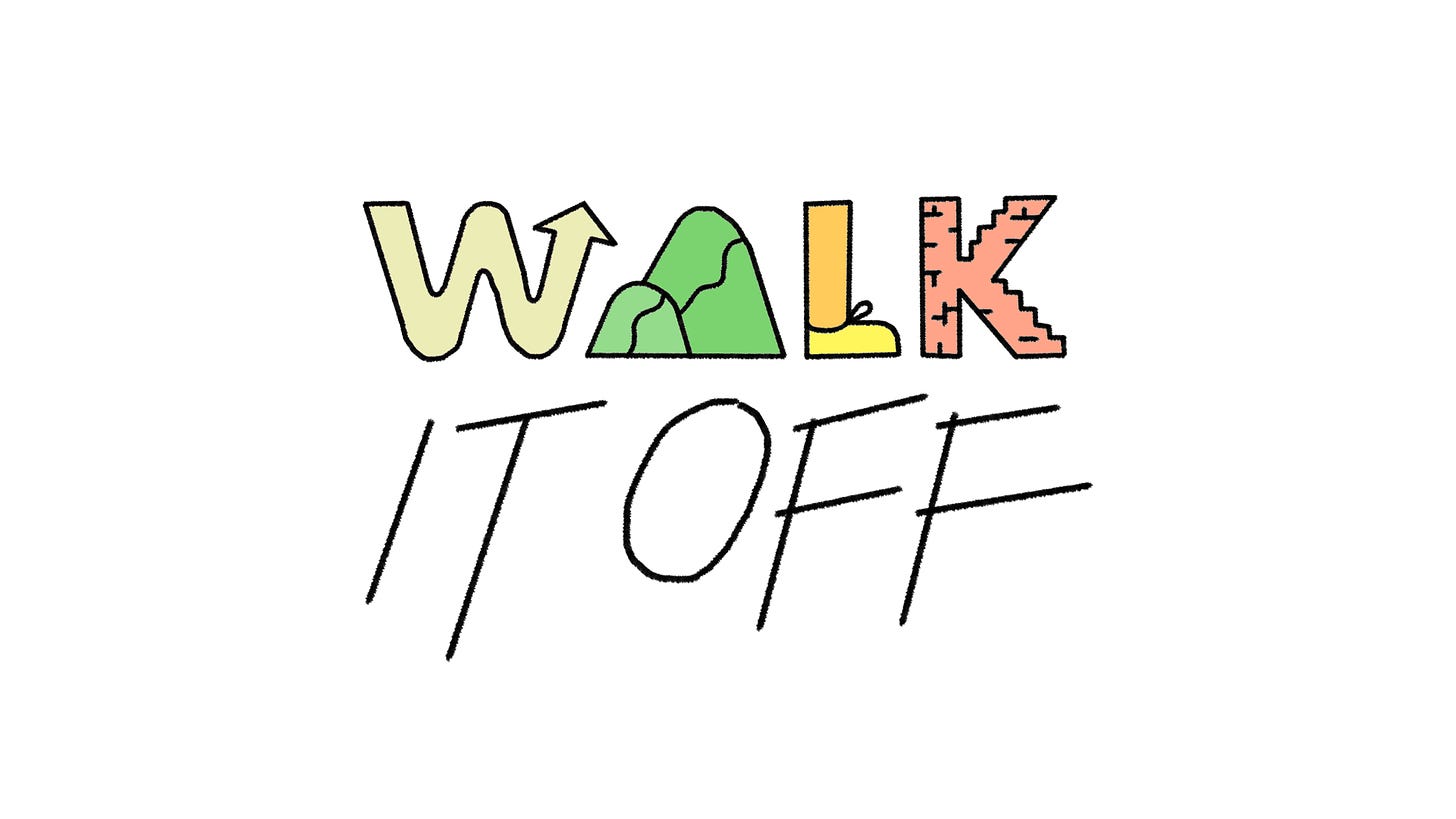
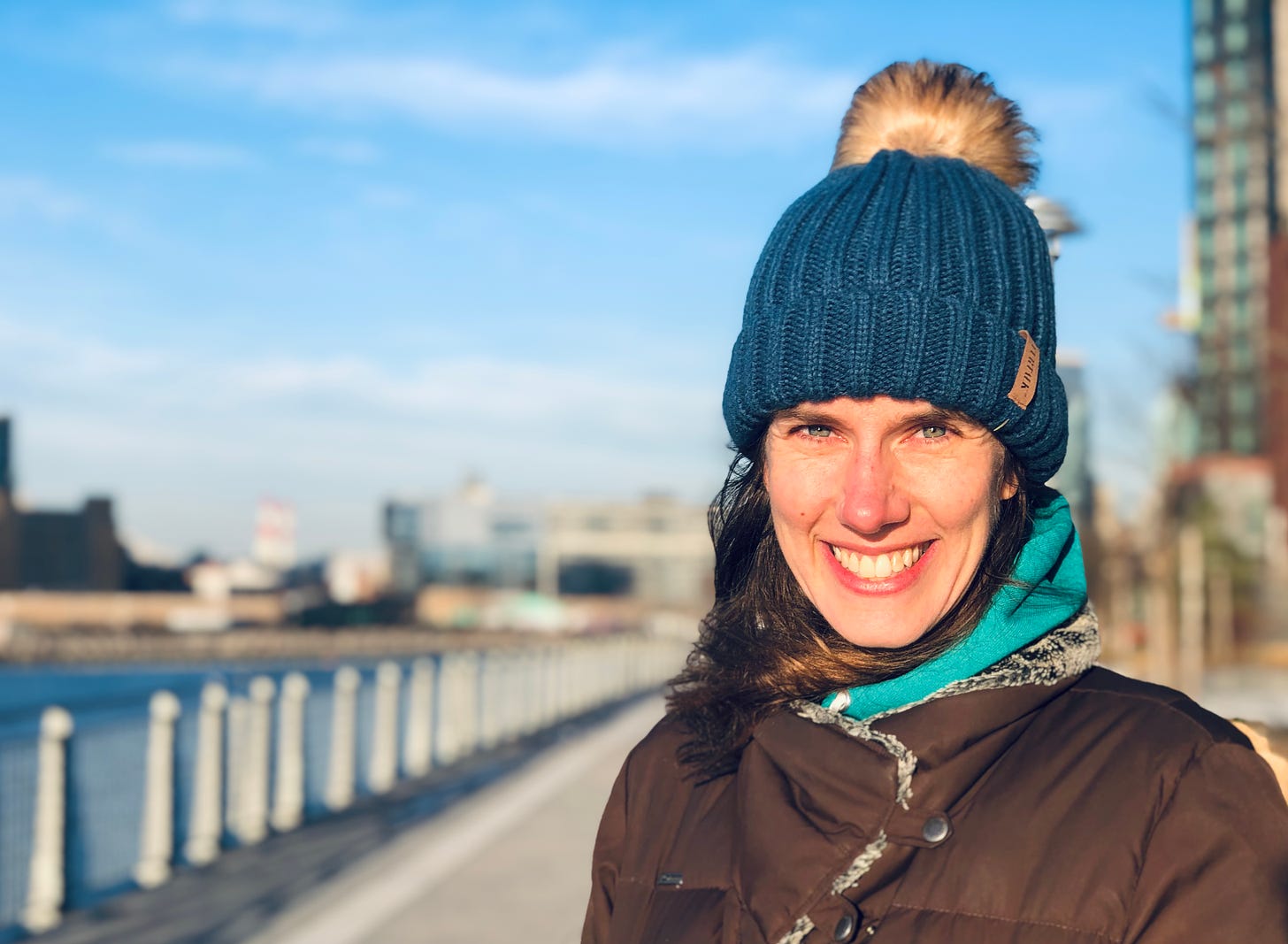
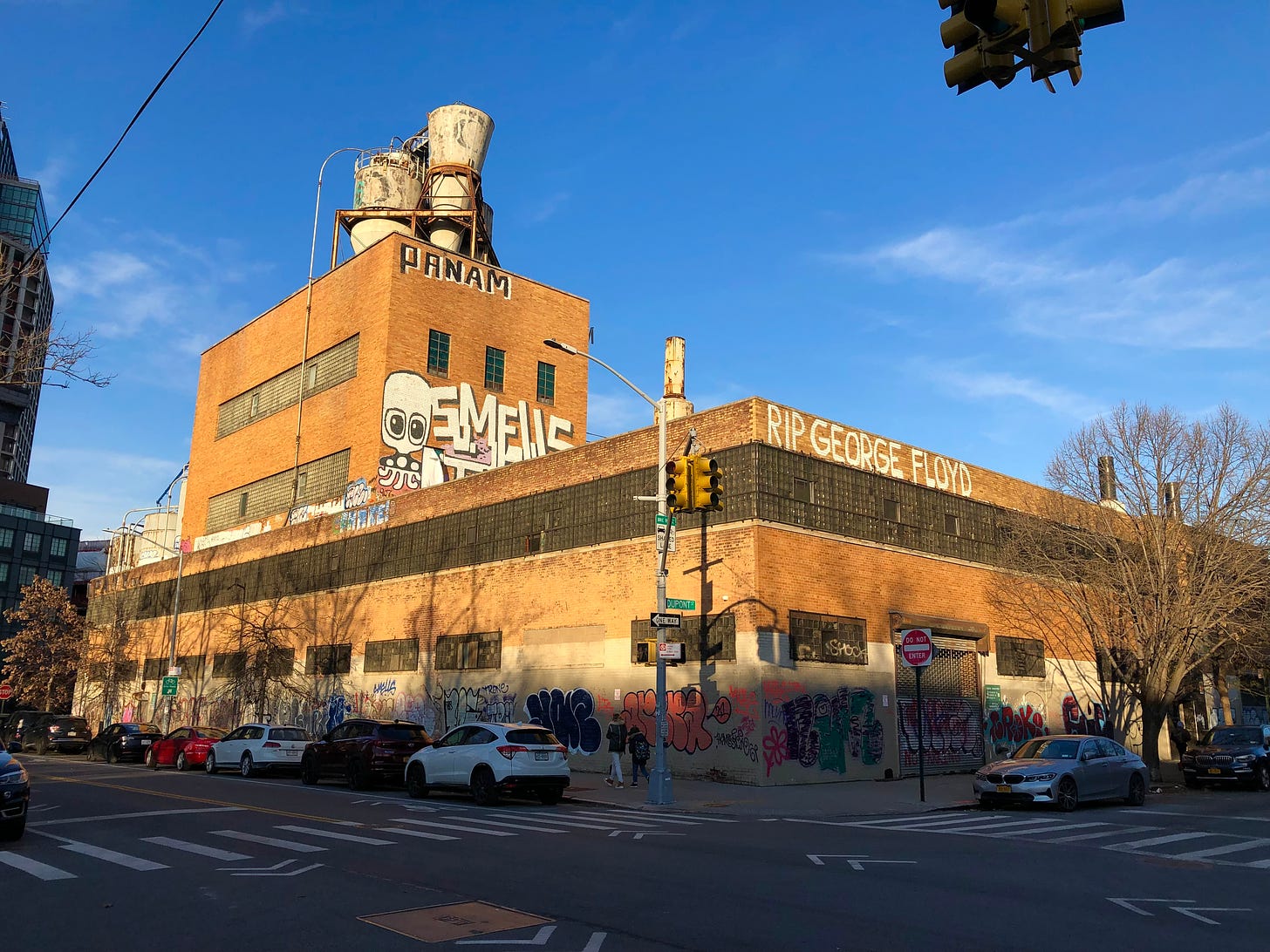
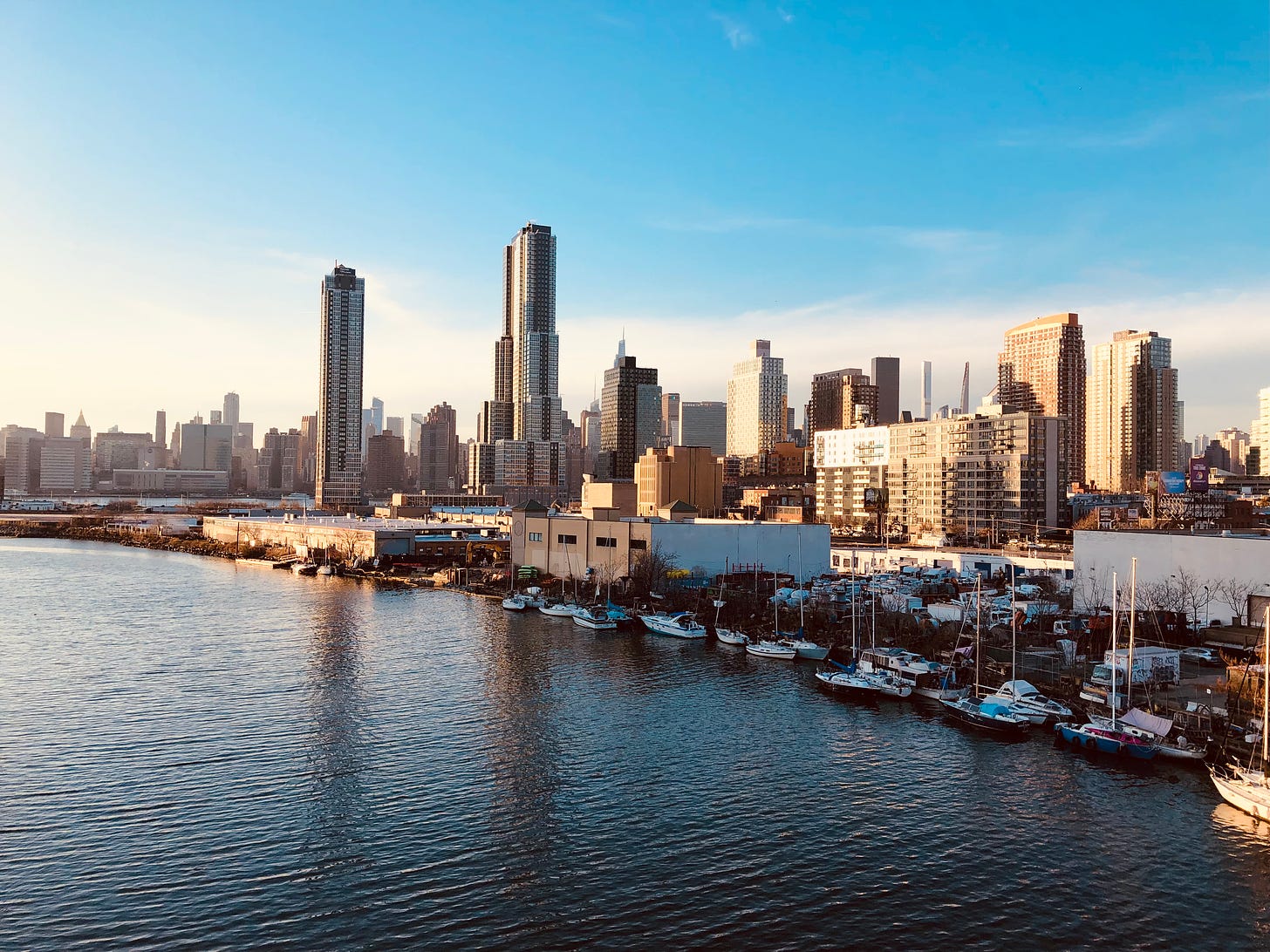
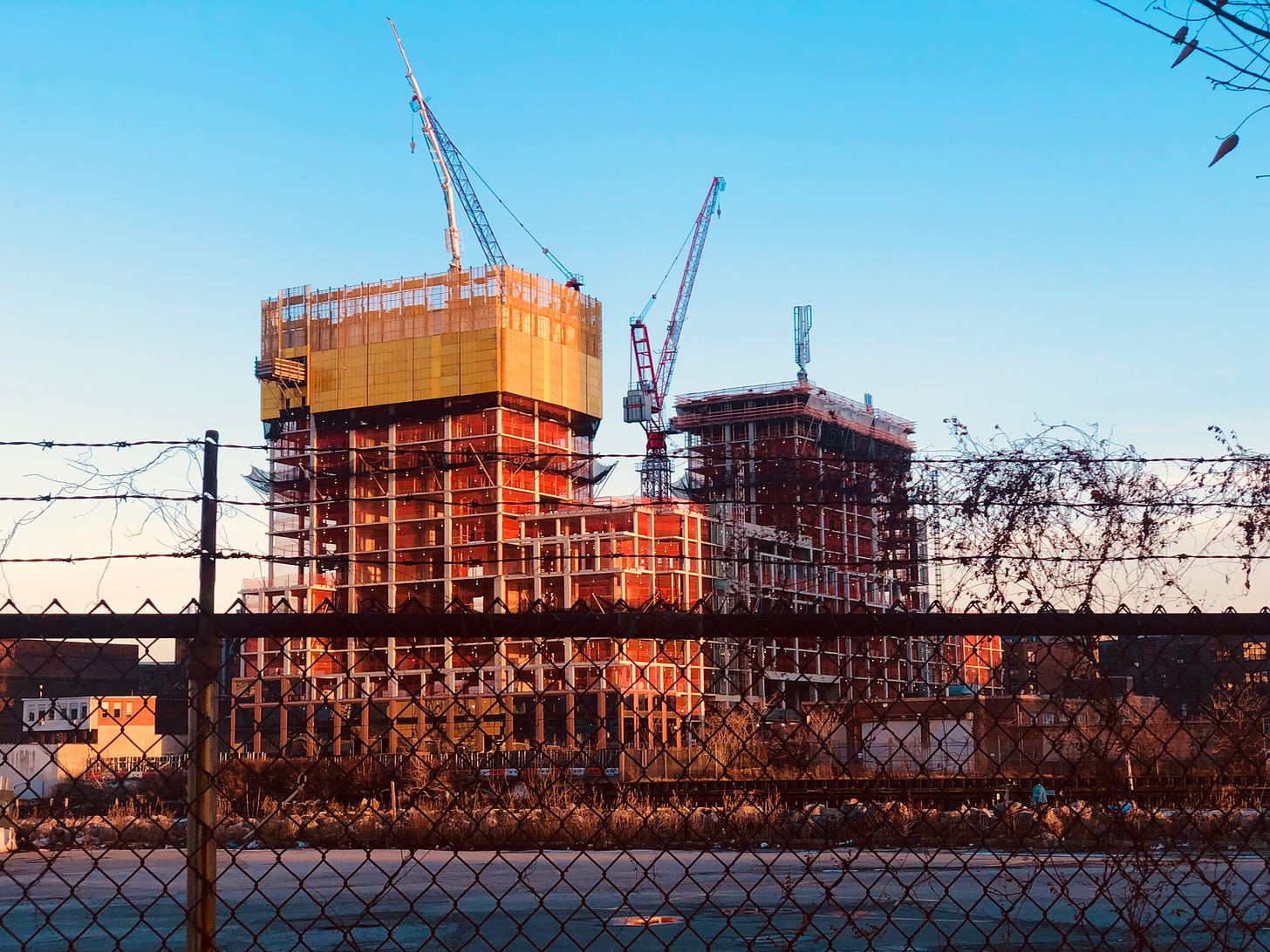
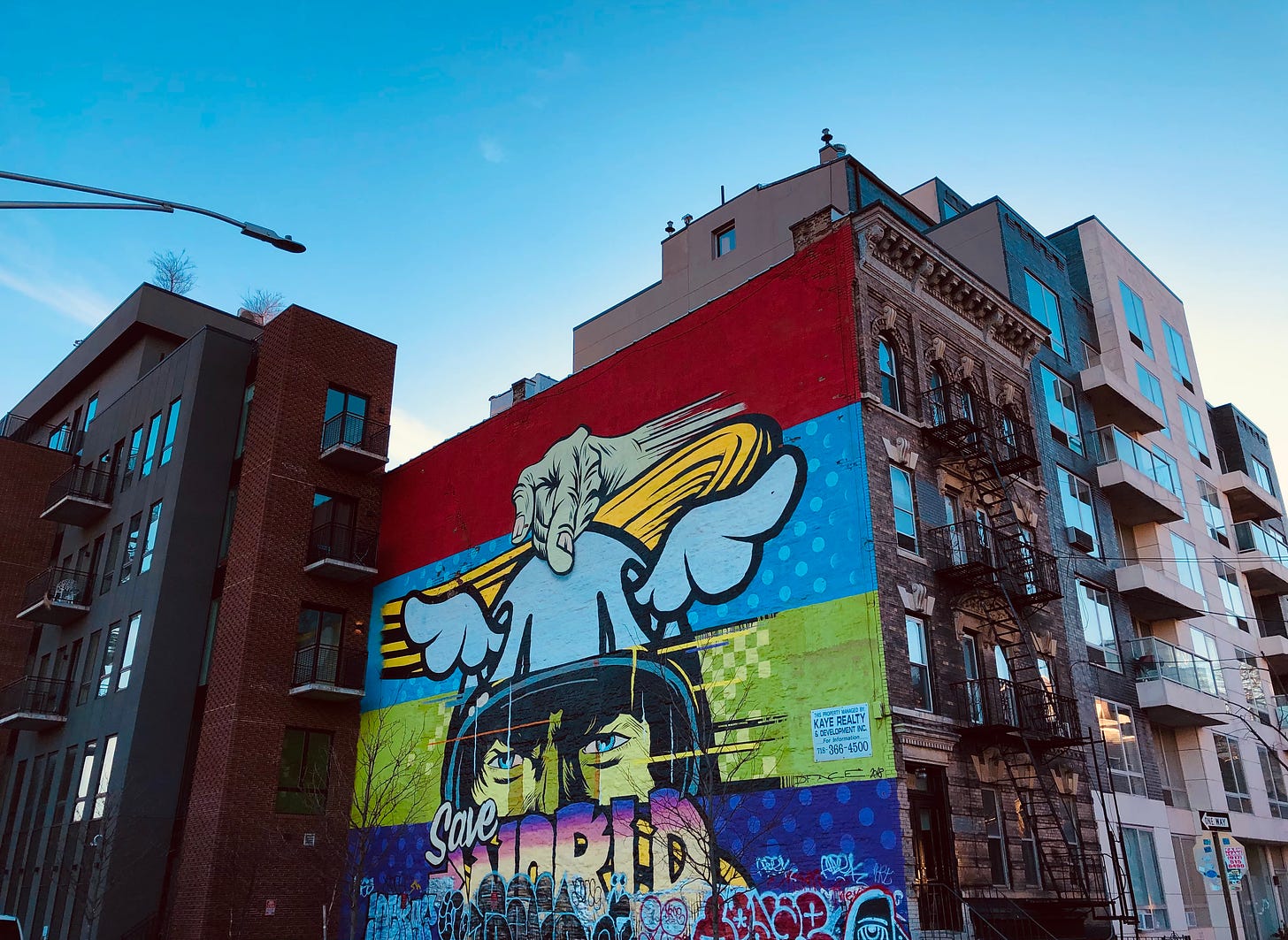
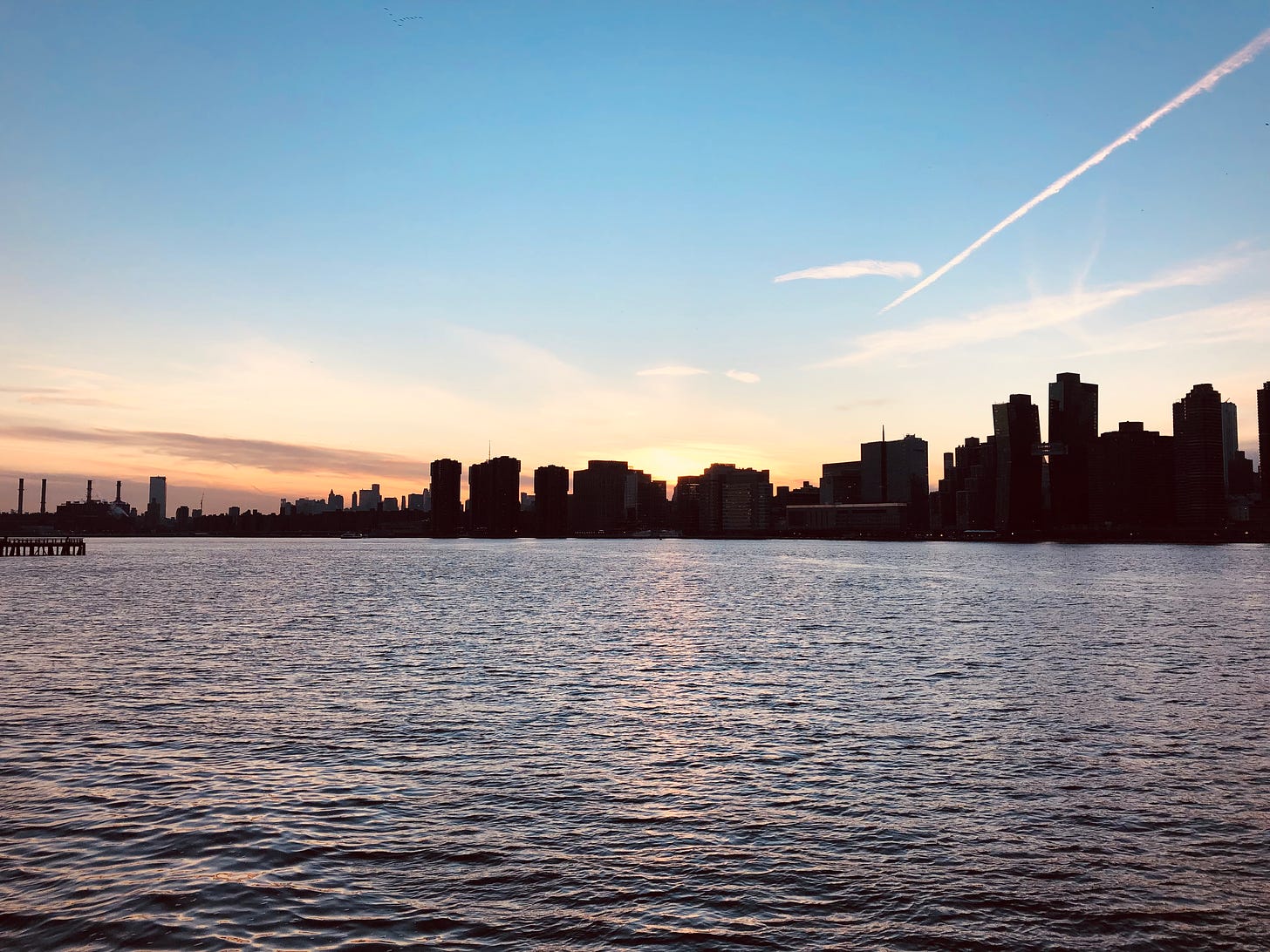
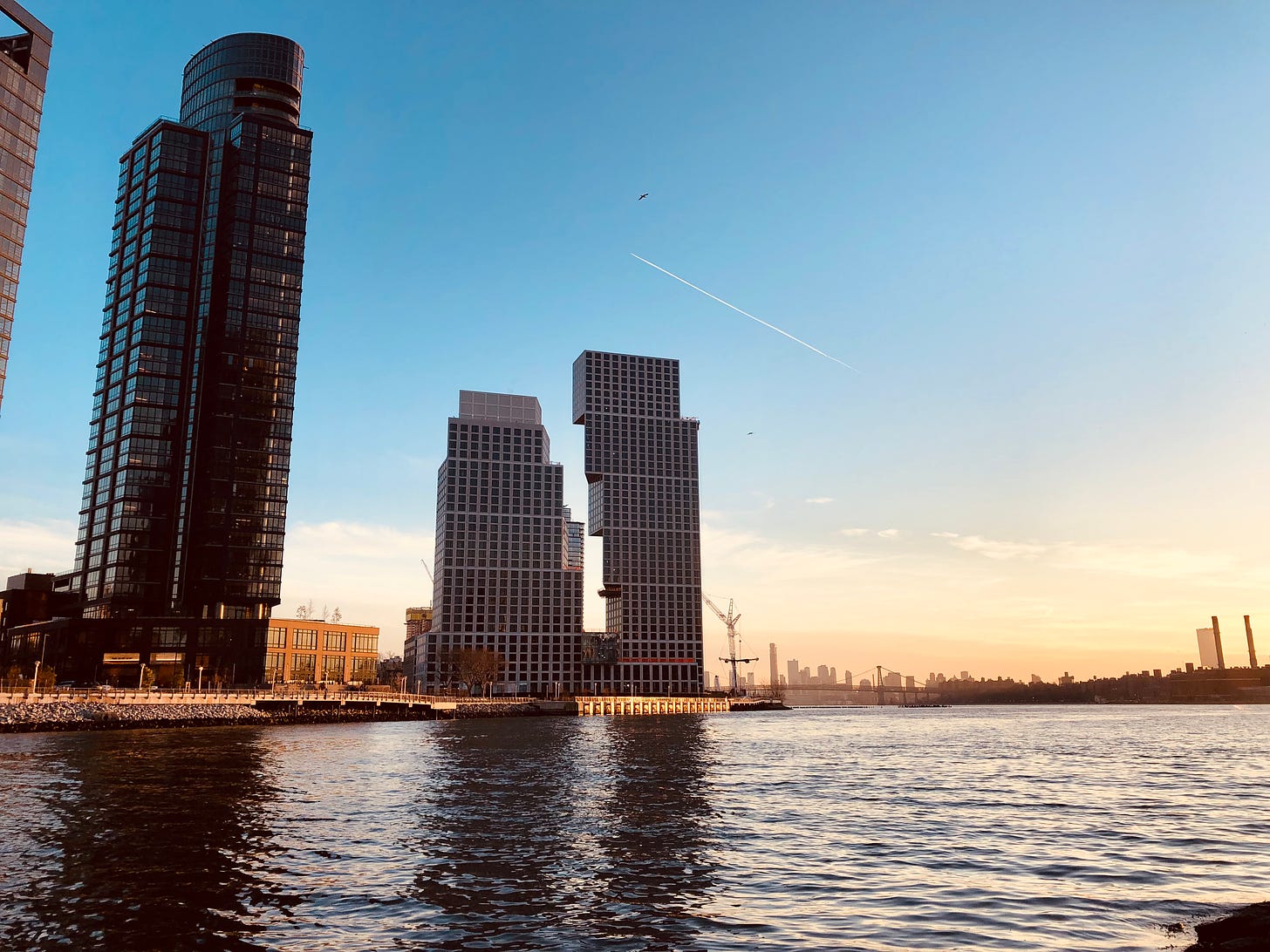
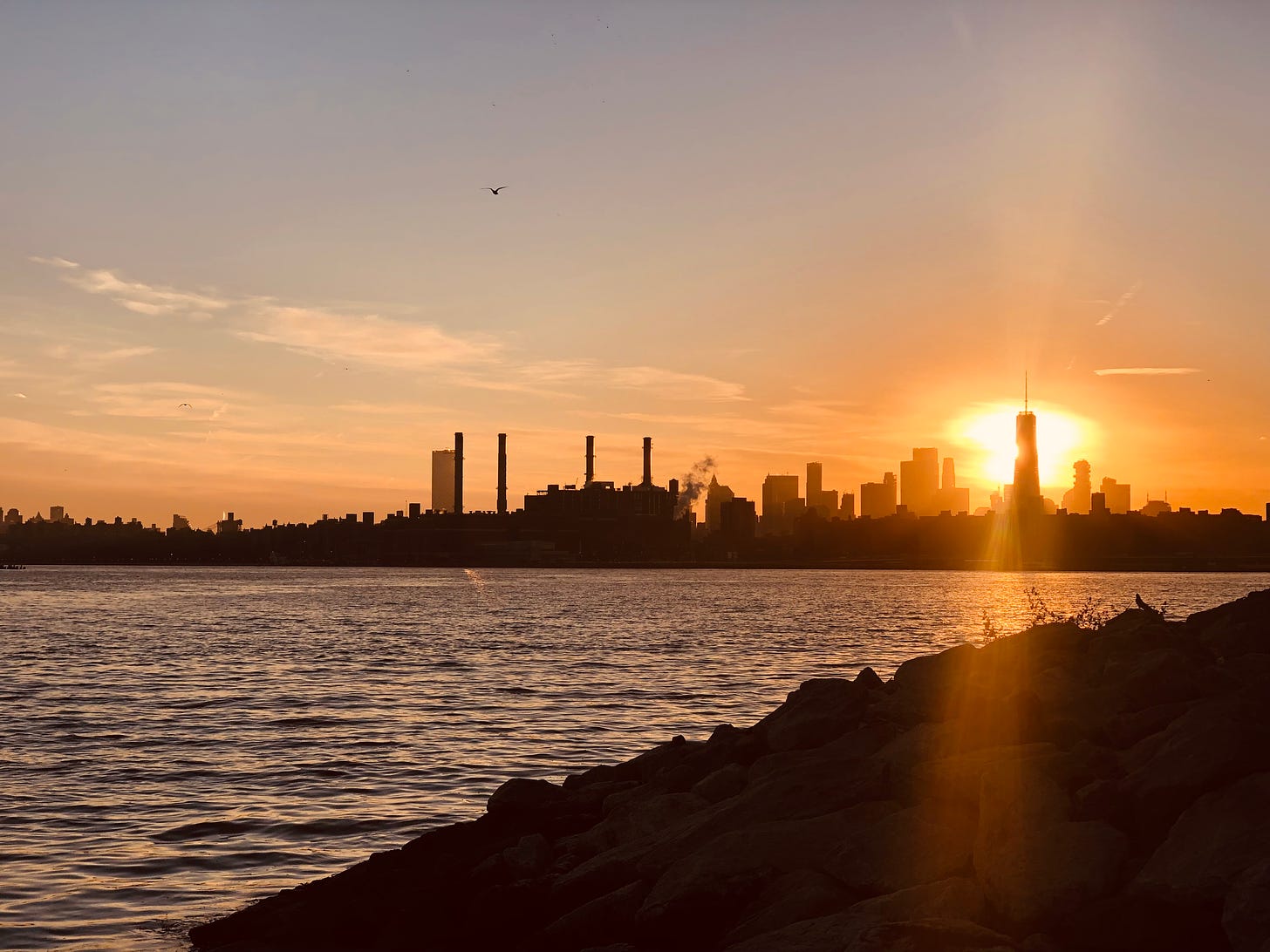
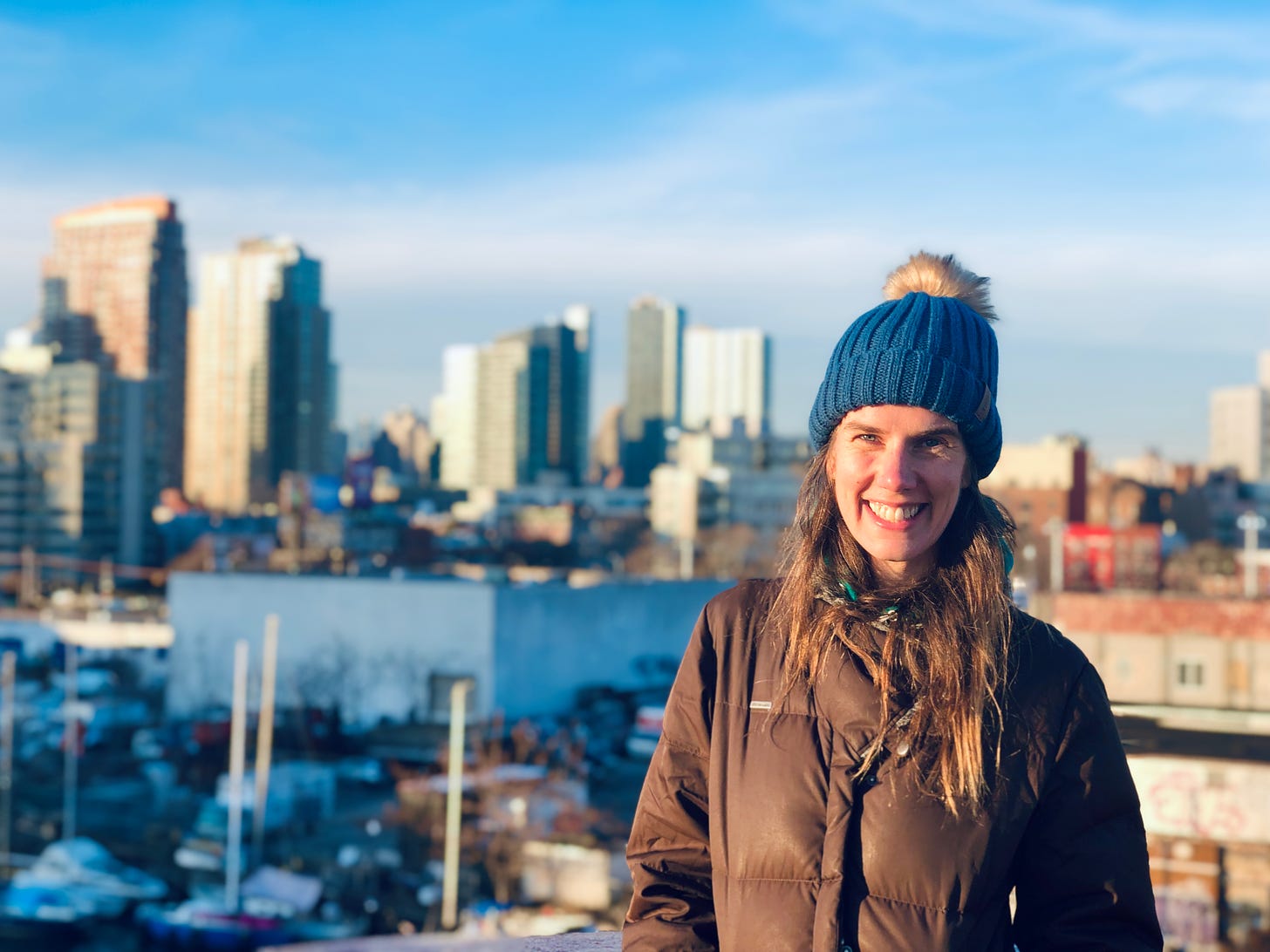
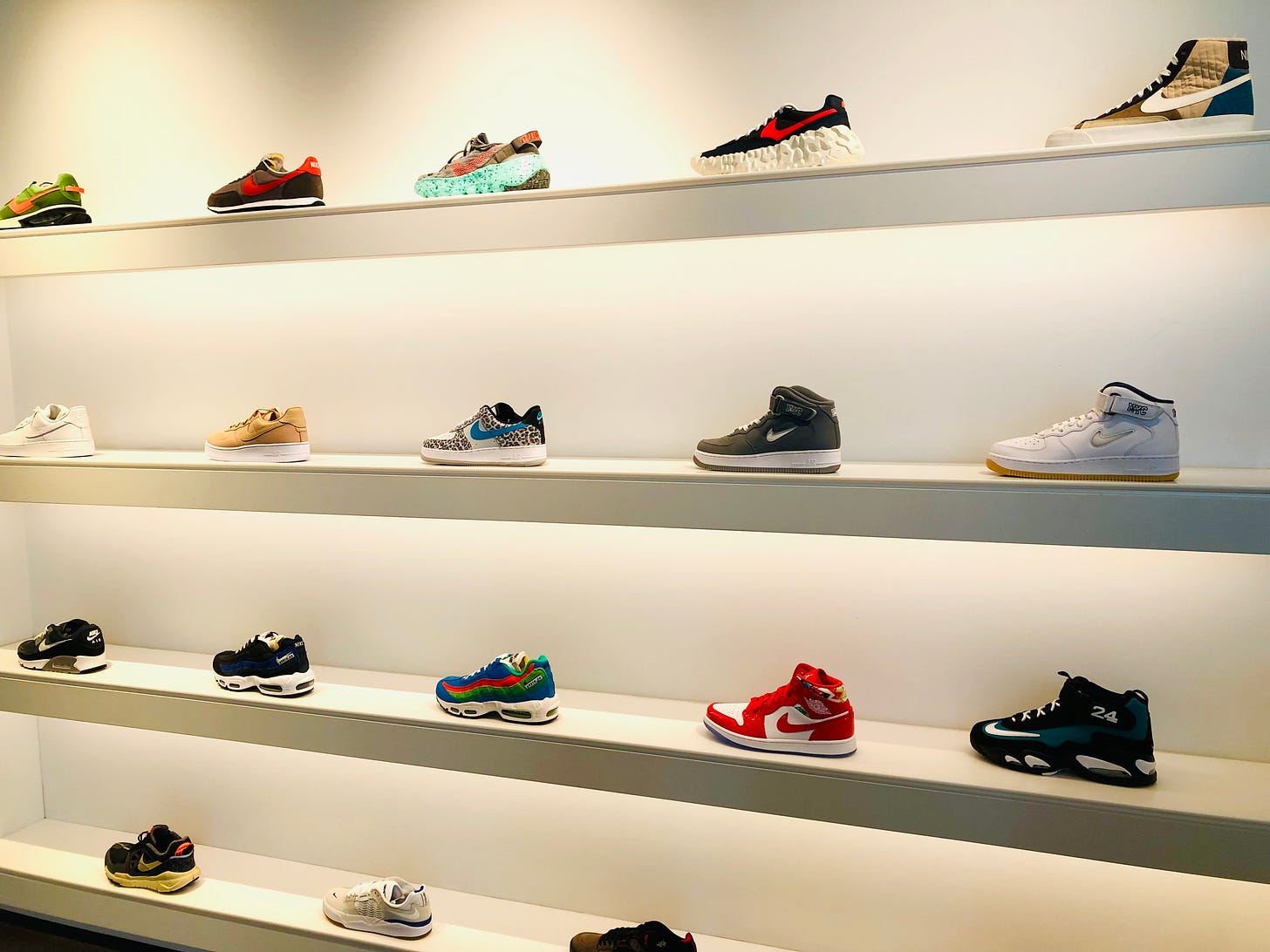
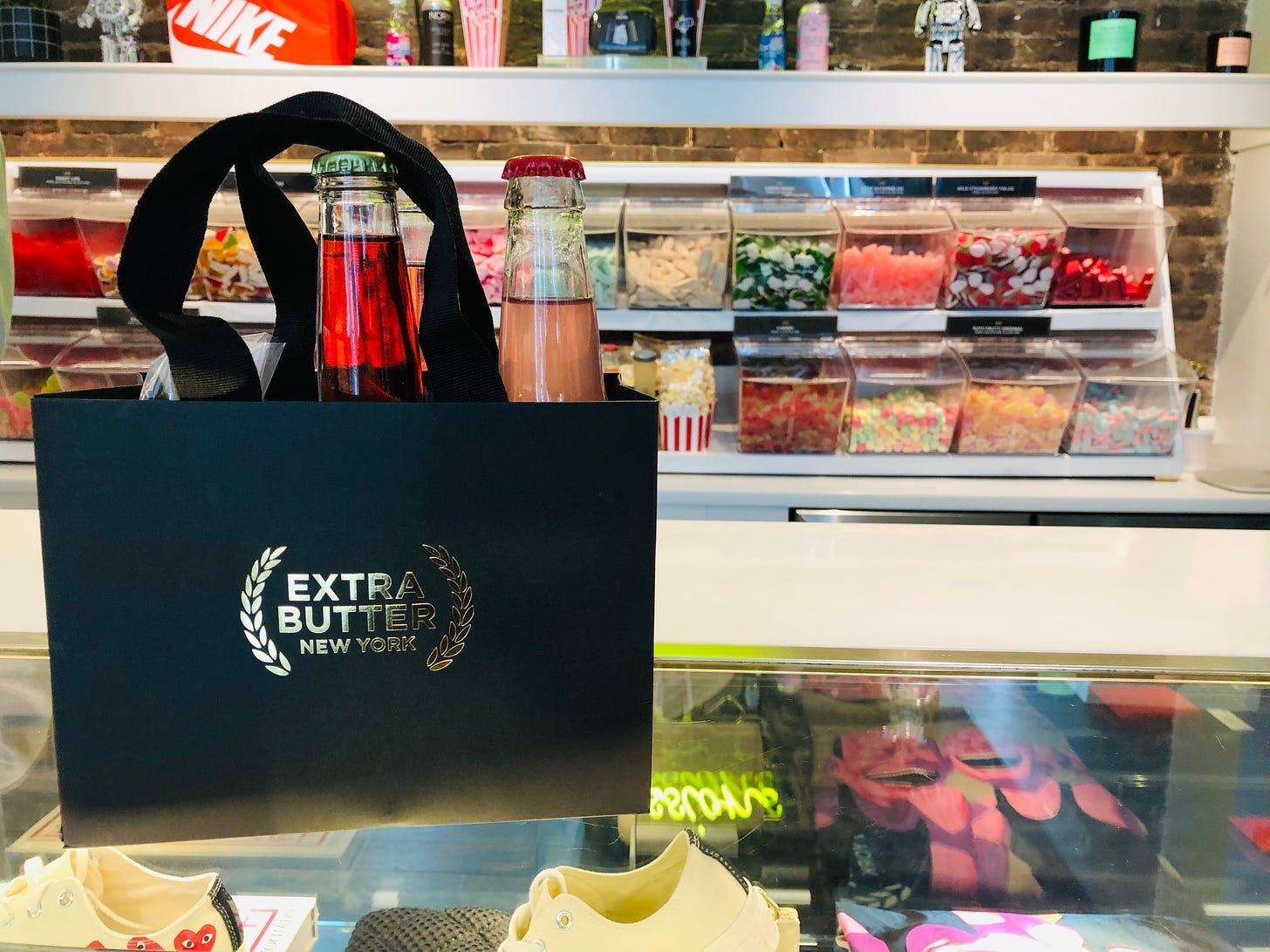
Some collect essays; I collect lyrics that speak to me, that relate to me in some way. Reading about this walk with Leslie Jamison kept reminding me of a line from one of my favorite Nickel Creek songs called "This Side" -- "Only the curious have something to find." Isaac, I especially liked what you said about "a church for storytelling." What a beautiful visual that painted in my mind.
I loved this one. Leslie looks so beautiful and now I totally want to move to Greenpoint.